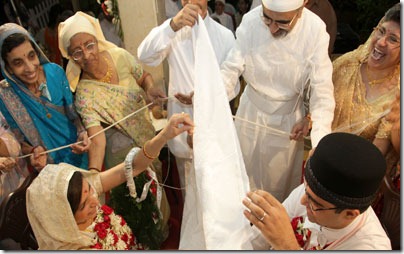I was fortunate recently to attend my first ever Parsi wedding. Two of the 40 or so Parsi staff in the Deputy High Commission in Mumbai, Nazneen (our press officer) and Burzin ( a member of the UKBA team), were getting married, and they had been kind enough to invite my wife and me to their wedding.
By Peter Beckingham, Deputy High Commissioner, Consulate of Great Britain, Mumbai

The Parsis have kept these traditions, and many more, ever since they first emigrated to India from Iran centuries ago. During the wedding the couple went to a nearby “Fire Temple” to pray. These are so named because a fire burns in them eternally as it represents purity, being the only element that cannot be contaminated. In continuance to the original vow made when they first sought refuge in India, Fire Temples admit only Parsis. Pheroza Godrej, who edited a superb book on the origins and development of Bombay, has produced a magnificently illustrated History of the Parsis. I can’t claim to have read it, but it is a labour of love and meticulous research, which wowed some recent visitors from Europe at her home.
The Parsis have a wholly disproportionate influence in Mumbai and India compared to their tiny population. Globally there are probably no more than 120,000, with the largest group outside Mumbai in Toronto.
The Parsi influence was underlined shortly after the wedding I attended by an announcement by the Tata Group – India’s largest business conglomerate, and of course with major interests in the UK, including JLR and Corus – that they were appointing as their next chair a Parsi, Cyrus Mistry. Tata was founded by a Parsi, Jamshyd Tata, who was brought up in the small, dusty trading town of Navsari on the Gujarat coast. He started a steel business in Eastern India, and from there his successors as Chairmen– Parsis all – have built the company into the $78bn megalith it is today.
There are other powerful business groups in India with Parsi owners, including the massive consumer and industrial goods manufacturer Godrej, and smaller companies like Pune-based Forbes Marshall and Thermax.
But the Parsi influence goes way beyond business. Tata have some of the most well-endowed Foundations and Institutes in India, and a significant proportion of the Group’s profits are ploughed under its constitution into these charitable organisations. It is no exaggeration to say that many of Mumbai’s most valuable research organisations, hospitals and cultural centres (for example the vibrant National Centre for the Performing Arts, run by a Parsi, Khushroo Suntook, formerly a senior Tata executive) could not survive without Tata, Godrej or other Parsi generosity.
So from a banana leaf feast to the next head of global giant Tata the Parsi influence continues to hold great sway in Mumbai.







